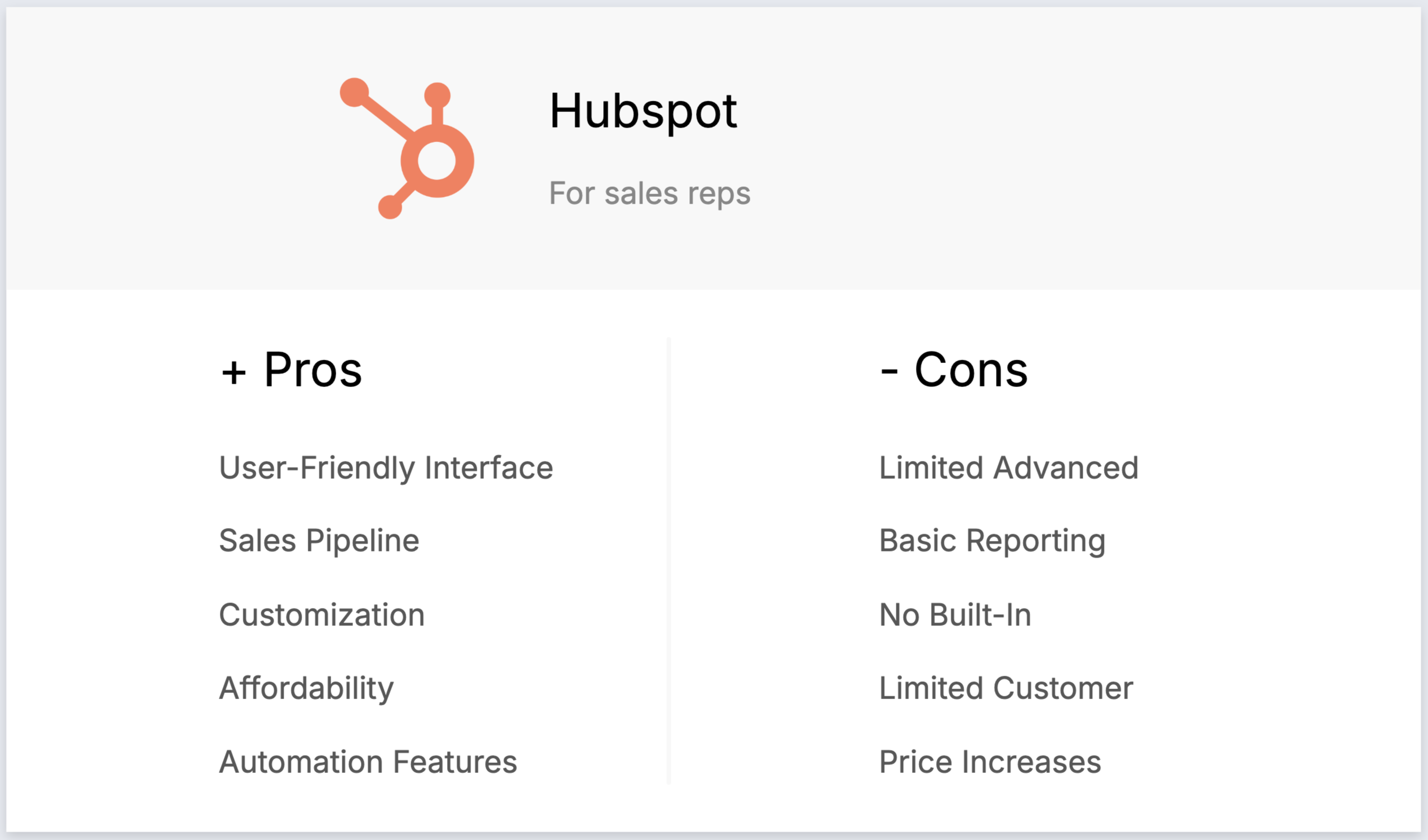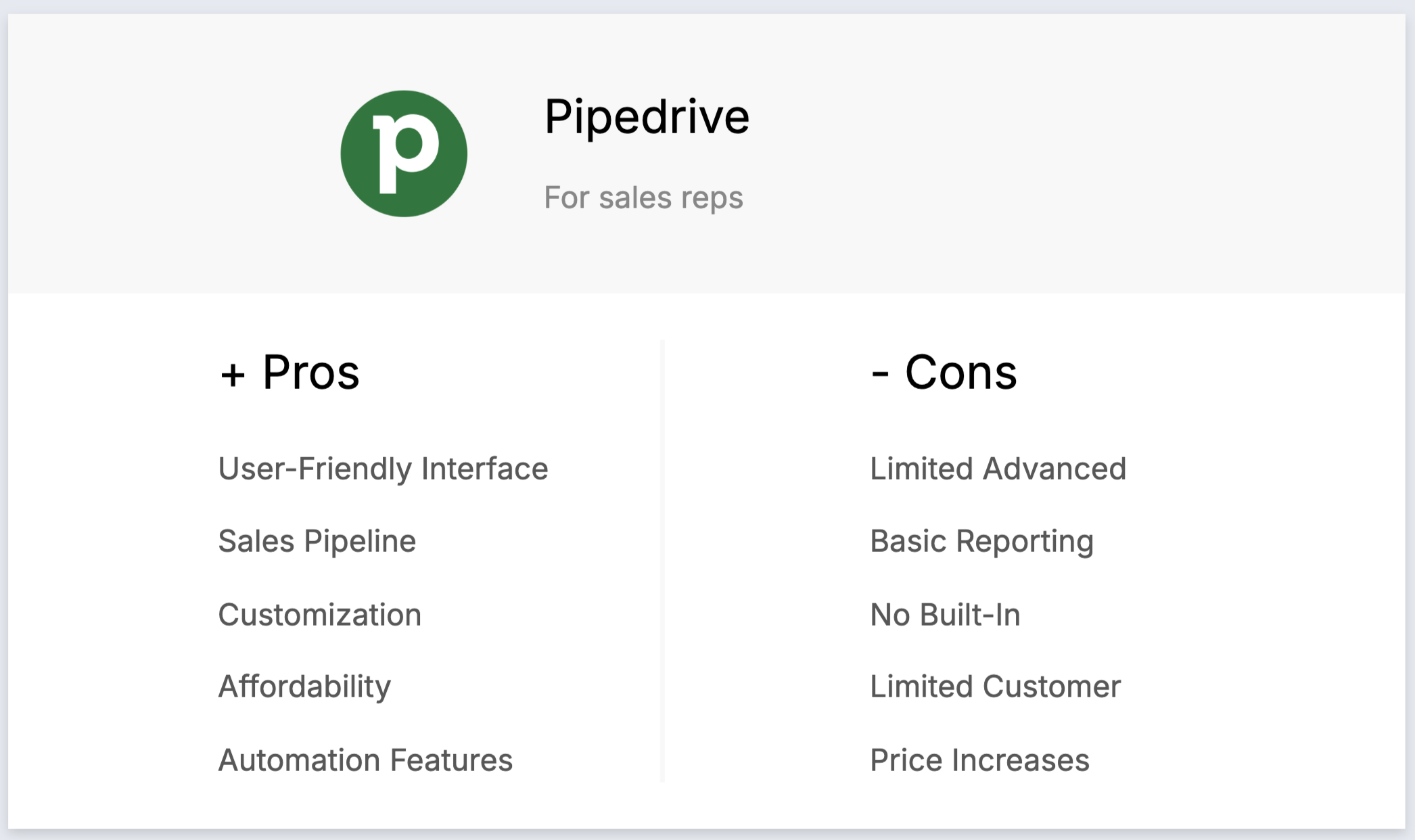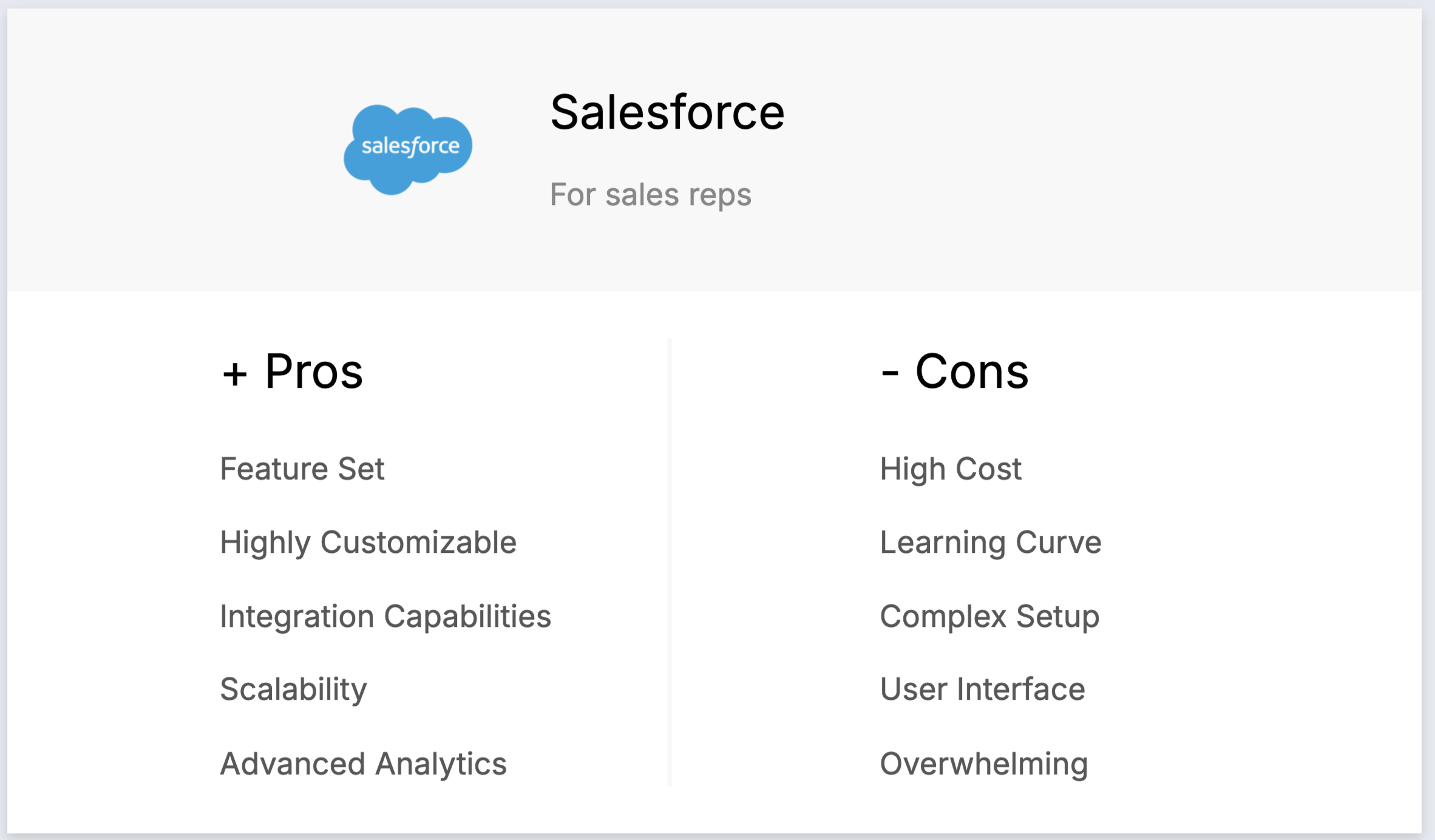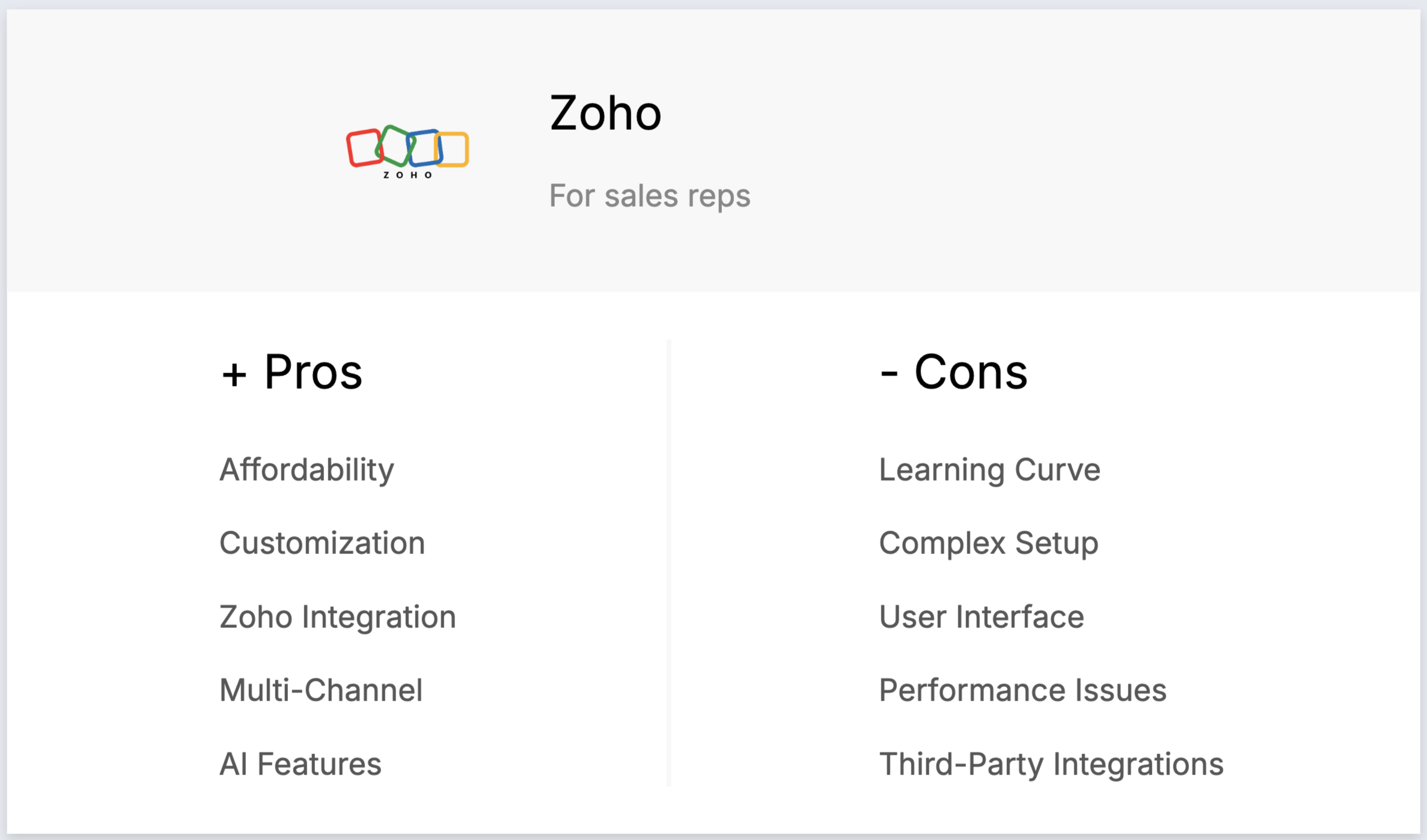Discover folk - the CRM for people-powered businesses
Why mid-sized sales teams need a purpose-built CRM
Sales reps in teams of 20-50 people don't just sell anymore—they build relationships, manage chaos, and drive consistent growth across multiple deals simultaneously.
To stay ahead, medium-sized sales teams need more than a contact list. They need smart tools that save time, boost productivity, and simplify outreach across channels while maintaining team coordination.
That's where the best CRM for sales reps comes in. A great CRM helps teams of 20-50 people track leads collectively, manage shared pipelines, and close deals systematically—without wasting hours on admin work or losing deals to poor handoffs.
But not all CRMs are made for mid-sized sales teams. Some are too basic for growing operations. Others are enterprise-bloated. And very few are truly built with teams of 20-50 reps in mind.
In this guide, we'll break down the top CRM platforms for sales teams your size—what makes them shine, where they fall short, and how to choose the one that fits your team's collaborative workflow.
Let's find your team's next secret weapon. 💥
At a glance: key takeaways for 20–50 person teams
The 6 best CRMs for sales reps
👉🏼 Try folk now to streamline LinkedIn prospecting for 20-50 person sales teams
👉🏼 Try folk now to manage contact-based reminders with your team
1. folk
folk is a modern CRM platform designed specifically for growing sales teams of 20-50 people, offering seamless contact management, collaborative workflows, and team-friendly integrations to enhance deal coordination and shared prospecting efforts.

Key features
- Contact enrichment: Automatically enriches contact details across your entire team database, finding emails and LinkedIn URLs for all 20-50 reps without manual work or additional per-seat costs.
- LinkedIn integration: Seamlessly import contacts from LinkedIn for team-wide prospecting, track conversations centrally, and share templates across all sales reps for consistent messaging.
- Email integration: Full email sync with shared templates and coordinated tracking, enabling teams to manage all communications and avoid duplicate outreach efforts.
- AI-powered features: AI tools specifically designed for medium-sized teams to automate lead assignment, suggest next actions, and optimize team productivity across all 20-50 members.
- Integrations: folk integrates with over 6,000 apps including team communication tools, enabling centralized workflows that scale perfectly for growing sales organizations.

Pros
- Perfect for mid-sized teams: folk is specifically designed for teams of 20-50 people, with intuitive collaboration features and scalable pricing that grows with your sales organization.
- All-in-one efficiency: folk eliminates the need for multiple tools by combining LinkedIn prospecting, automated email finding, coordinated outreach sequences, and shared pipeline tracking—saving significant costs for medium teams.
- Team collaboration: Built-in features for sharing contacts, coordinating outreach, avoiding duplicate efforts, and maintaining consistent messaging across all 20-50 sales reps.
- Rapid deployment: Quick setup and onboarding process perfect for busy growing teams that need to get all reps productive quickly without extensive training.
- Scalable integrations: Over 6,000 app integrations ensure your team can connect existing tools and workflows without disruption as you grow from 20 to 50 people.
Cons
- Reporting and analytics: folk includes advanced analytics and dashboards today, such as pipeline and deal stage analytics, revenue forecasting with weighted probabilities, and performance breakdowns by owner, channel, industry, region, or any custom field.
Price and plans
You can try folk for free with a 14-day trial perfect for testing with your entire sales team. Pricing scales efficiently for teams of 20-50 people:
- Standard: $20 per user, per month - ideal for growing teams
- Premium: $40 per user, per month - perfect for established 20-50 person teams
- Custom: Starts from $60 per user, per month - for teams requiring specialized features
2. OnePageCRM
OnePageCRM is a streamlined CRM designed for sales teams who want to manage their entire sales process efficiently. For teams of 20-50 people, it offers coordinated lead capture, systematic follow-up management, and team-wide visibility into sales activities.

Key Features
- Team lead tracking: OnePageCRM helps coordinate lead management across your 20-50 person sales team, with shared follow-up visibility and team-wide lead distribution capabilities.
- Automatic team prioritization: The system automatically prioritizes leads for your entire team, ensuring urgent follow-ups are highlighted across all reps and nothing falls through the cracks in a medium-sized organization.
- Coordinated lead capture: Browser extension and web forms feed leads directly into your team's shared system, enabling efficient distribution among your 20-50 sales reps.
- Team sales forecasting: Pipeline forecasting provides revenue predictions across your entire medium-sized sales team, helping managers track performance of 20-50 individual contributors.
- Shared sales quotes: Automated quote generation with team-wide product catalogs ensures consistent pricing and proposals across all your sales reps.
Pros
- Team-focused simplicity: OnePageCRM prioritizes usability for sales teams rather than complex management features, making it ideal for coordinating 20-50 reps efficiently.
- Collaborative sales tracking: Team members can easily see shared leads, coordinate follow-ups, and track collective sales performance without jumping between systems.
- Cost-effective automation: Simple workflow automation helps medium-sized teams reduce administrative overhead without the complexity of enterprise solutions.
- Affordable team pricing: At $9.95 per user, it's budget-friendly for teams of 20-50 people who need essential CRM functionality without premium features.
- Responsive team support: Quality assistance available to help coordinate onboarding and troubleshooting across your entire sales team.
Cons
- No free plan: Teams of 20-50 people must budget for paid plans from day one, though the 21-day trial helps evaluate fit before committing.
Price and plans
OnePageCRM offers a 21-day team trial for evaluating with your entire sales organization. Pricing for teams of 20-50 people:
- Professional: $9.95 per user/month - excellent value for medium-sized teams
- Business: $19.95 per user/month - includes advanced features for growing 20-50 person teams
3. Hubspot
Hubspot CRM is a comprehensive platform offering integrated sales, marketing, and service tools that can support teams of 20-50 people, though it may require careful plan selection to balance features with cost-effectiveness.

Key features
- Marketing Hub: Coordinates email marketing, ad tracking, and lead generation across teams of 20-50 people, though costs can escalate quickly for medium-sized organizations.
- Sales Hub: Provides team deal tracking, shared pipeline management, and sales automation suitable for coordinating multiple reps, though advanced features require higher-tier plans.
- Service Hub: Customer service tools like ticketing and knowledge bases can support post-sales efforts across medium-sized sales teams.
- Operations Hub: Process automation across business systems, though complexity may require dedicated admin resources for teams of 20-50 people.
- Team lead scoring: Prioritizes leads across your sales organization, though predictive features are limited in lower-cost plans suitable for medium teams.

Pros
- Familiar interface: HubSpot's user-friendly design makes onboarding easier for teams of 20-50 sales reps, reducing training time across medium-sized organizations.
- Free plan availability: The free tier can help medium teams get started, though limitations become apparent as teams of 20-50 people require more advanced coordination features.
- Integrated ecosystem: Marketing and sales alignment works well for teams that need coordinated lead nurturing and sales handoffs across 20-50 reps.
- Automation capabilities: Workflow automation can streamline repetitive tasks across medium-sized sales teams, improving overall efficiency.
- Learning resources: HubSpot Academy provides training that can help teams of 20-50 people maximize platform usage.
Cons
- Expensive scaling: Costs can become prohibitive for teams of 20-50 people as essential features require higher-tier plans, potentially exceeding medium team budgets.
- Limited free plan features: Free plan restrictions become quickly apparent for teams of 20-50 people who need advanced coordination and customization capabilities.
- Complex advanced setup: Teams of 20-50 people may need dedicated administrators to fully utilize advanced features and custom reporting.
- Email sending limits: Email marketing restrictions can be problematic for medium-sized sales teams conducting extensive outreach campaigns.
- Feature lock-in: Advanced reporting and analytics essential for managing 20-50 person teams are often restricted to expensive higher-tier plans.
Price and plans
HubSpot's pricing for teams of 20-50 people requires careful evaluation:
- Starter: $15 per user, per month - may lack features for medium teams
- Professional: $450 per user, per month - expensive for 20-50 person teams
- Enterprise: $1,500 per user, per month - cost-prohibitive for most medium-sized organizations
4. Pipedrive
Pipedrive is a sales-focused CRM that can work for teams of 20-50 people, offering visual pipeline management and lead coordination, though it may require multiple tool integrations for complete functionality.

Key features
- Team deal management: Centralized tools for teams of 20-50 people to manage shared leads and coordinate sales pipelines, though lacks native LinkedIn integration for prospecting.
- Sales automation: Workflow automation for medium-sized teams to handle repetitive tasks like lead routing and follow-ups, though email sequences require additional tools.
- Email integration: Basic email sync and templates, but teams of 20-50 people may need separate tools for comprehensive email campaign management.
- Pipeline reporting: Analytics for tracking team performance across medium-sized organizations, though advanced reporting requires higher-tier plans.
- Team customization: Options to customize pipelines for coordinating 20-50 person sales teams, with user permissions for different access levels.

Pros
- Visual pipeline design: Intuitive interface makes it easier for teams of 20-50 people to track deals and coordinate sales activities across the organization.
- Sales-focused approach: Purpose-built for managing sales pipelines, which can work well for medium-sized teams with straightforward sales processes.
- Team customization: Allows customization for coordinating workflows across 20-50 person sales teams with different roles and responsibilities.
- Mid-range pricing: More affordable than enterprise solutions while offering features suitable for medium-sized sales organizations.
- Process automation: Helps streamline repetitive tasks across teams of 20-50 people, though limited compared to more comprehensive platforms.
Cons
- Limited prospecting features: Teams of 20-50 people need separate tools for LinkedIn integration and contact enrichment, increasing overall tool costs.
- Basic reporting in lower tiers: Advanced analytics essential for managing medium-sized teams require expensive plan upgrades.
- No native email marketing: Teams of 20-50 people must integrate additional tools for comprehensive email campaigns and sequences.
- Limited support hours: Support availability may not match the needs of growing 20-50 person sales organizations across different time zones.
- Add-on costs: Essential features for medium teams often require additional paid integrations, increasing total cost of ownership.
Price and plans
Pricing for teams of 20-50 people can add up quickly with necessary add-ons:
- Essential plan: Starts from $14 per user, per month - basic for medium teams
- Advanced plan: Starts from $29 per user, per month - better for team coordination
- Power plan: Starts from $64 per user, per month - includes more advanced features
- Enterprise plan: Starts from $99 per user, per month - expensive for 20-50 person teams
5. Salesforce
Salesforce is an enterprise-grade CRM platform that may be overpowered and cost-prohibitive for most teams of 20-50 people, requiring significant implementation resources and ongoing administration.

Key features
- Enterprise ecosystem: Comprehensive platform with extensive capabilities, though complexity often overwhelming for teams of 20-50 people who need straightforward sales coordination.
- Advanced customization: Highly customizable but requires dedicated administrators and consultants, making it cost-prohibitive for medium-sized sales teams.
- AI integration: Salesforce Einstein provides advanced analytics, though often requires expensive add-ons and may be overkill for 20-50 person teams.
- Extensive integrations: Broad integration capabilities through AppExchange, though setup complexity requires specialized expertise for medium teams.
- Enterprise security: Robust security and compliance features designed for large corporations, often unnecessary for teams of 20-50 people.

Pros
- Comprehensive functionality: Extensive features that can theoretically support any business need, though most capabilities exceed the requirements of 20-50 person sales teams.
- Enterprise-grade customization: Highly configurable, but customization complexity requires dedicated resources that medium-sized teams typically lack.
- Broad integration ecosystem: Vast array of integrations available, though implementation often requires specialized consultants for teams of 20-50 people.
- Long-term scalability: Can grow with organizations, though cost trajectory makes it impractical for most medium-sized sales teams.
- Advanced analytics: Powerful reporting capabilities, though complexity and cost often exceed the needs of 20-50 person teams.
Cons
- Prohibitive costs: Extremely expensive for teams of 20-50 people, with licensing and implementation costs that can easily exceed medium team budgets.
- Implementation complexity: Requires specialized consultants and lengthy setup processes that are impractical for medium-sized sales organizations.
- Steep learning curve: Overwhelming complexity makes training 20-50 people extremely time-consuming and expensive.
- Interface complexity: Outdated and complex interface creates adoption challenges across medium-sized sales teams.
- Overkill for medium teams: Extensive enterprise features are unnecessary overhead for teams of 20-50 people who need streamlined sales coordination.
Price and plans
- Starter Suite: $25/user/month - limited features, still expensive for 20-50 person teams
- Pro Suite: $100/user/month - costly for medium teams ($2,000-5,000/month)
- Enterprise Plan: $165/user/month - prohibitively expensive ($3,300-8,250/month)
- Unlimited Plan: $330/user/month - far beyond medium team budgets ($6,600-16,500/month)
- Einstein 1 Sales: $500/user/month - completely impractical for teams of 20-50 people
6. Zoho
Zoho is an affordable CRM option that can work for teams of 20-50 people, offering sales automation and contact management, though it may require workarounds for LinkedIn integration and has limited third-party connectivity.

Key features
- Team Sales Automation: Automates sales coordination across teams of 20-50 people including lead distribution, deal tracking, and follow-up management.
- Contact Management: Manages customer information for medium-sized teams, though LinkedIn integration requires manual importing which can be inefficient for 20-50 reps.
- Multi-Channel Communication: Integrates email, phone, and basic social media management, suitable for coordinating outreach across medium-sized sales teams.
- Team Pipeline Management: Visual pipeline management with team collaboration features, appropriate for coordinating 20-50 person sales organizations.
- AI Assistant (Zia): Provides analytics and task suggestions for medium teams, though capabilities are limited compared to specialized sales AI tools.

Pros
- Cost-effective pricing: Competitive pricing makes it accessible for teams of 20-50 people operating on medium budgets, especially compared to enterprise solutions.
- Team customization: Extensive customization options allow medium-sized sales teams to tailor workflows and fields to their specific coordination needs.
- Zoho ecosystem integration: Works well with other Zoho products, which can benefit teams of 20-50 people needing multiple business functions in one ecosystem.
- Multi-channel coordination: Supports email, phone, and social media management for teams coordinating outreach across multiple channels.
- AI-powered insights: Zia AI provides analytics and task automation suitable for medium-sized sales teams, though not as advanced as specialized tools.
Cons
- Complex team onboarding: Extensive customization options can overwhelm teams of 20-50 people, requiring significant time investment to train all reps effectively.
- Setup complexity: Initial configuration can be challenging for medium-sized teams without dedicated IT resources or CRM administrators.
- Interface limitations: Some teams find the interface outdated compared to modern CRMs, which can impact adoption across 20-50 person organizations.
- Performance issues: Occasional slowdowns with larger datasets can impact productivity for medium-sized teams managing extensive prospect databases.
- Limited external integrations: Restricted third-party integrations can be problematic for teams of 20-50 people using diverse tool stacks for sales operations.
Price and plans
Zoho offers a free plan limited to 3 users (insufficient for teams of 20-50 people). Pricing for medium teams:
- Standard: $14 per user, per month - basic for 20-50 person teams
- Professional: $23 per user, per month - better feature set for medium teams
- Enterprise: $40 per user, per month - comprehensive for growing 20-50 person organizations
Why you need a CRM
For sales teams of 20-50 people, leveraging a CRM becomes essential for maintaining coordination, preventing leads from falling through cracks, and scaling sales operations efficiently. From enabling seamless collaboration between reps to tracking deals across multiple team members, there are significant benefits that directly impact medium-sized organizations.
Challenges without a CRM
Below are common challenges faced by teams of 20-50 sales reps when managing sales without a coordinated CRM system:
- Team disorganization: Sales data scattered across individual spreadsheets and personal emails, making team coordination nearly impossible.
- Missed team opportunities: Leads fall through cracks when handoffs between 20-50 reps lack proper tracking and follow-up coordination.
- Inefficient team processes: Multiple reps duplicating manual data entry and tracking efforts, wasting collective productivity across medium teams.
- Lack of team insights: No centralized view of team performance, making it impossible to analyze collective sales trends across 20-50 people.
- Inconsistent team communication: Miscommunication between team members and conflicting client interactions when 20-50 reps lack coordination.
Benefits of a CRM
A well-implemented CRM transforms how teams of 20-50 people operate together, delivering coordinated benefits that scale across medium-sized organizations:
- Centralized team information: All customer data accessible to every team member, enabling seamless collaboration across 20-50 sales reps.
- Enhanced team efficiency: Automate repetitive tasks across the entire team and streamline coordinated workflows for maximum collective productivity.
- Improved team relationships: Track all interactions centrally so any team member can pick up conversations and maintain consistent client relationships.
- Better team decision-making: Real-time analytics and reporting provide insights into team performance and collective sales trends across all 20-50 reps.
- Increased team sales: Coordinate lead distribution and ensure high-potential prospects receive prompt attention from the right team members.
- Consistent team communication: Ensure uniform messaging and coordinated follow-ups across all 20-50 sales reps for professional client experience.
Key features of a CRM for sales reps
For teams of 20-50 people, specific CRM features become critical for coordination and collective productivity:
- Team automated processes: Streamlines tasks across all 20-50 reps by automating repetitive workflows, freeing your entire team to focus on selling rather than administrative work.
- Shared contact enrichment: Automatically finds and updates contact information for the entire team database, ensuring all 20-50 reps have access to complete prospect data.
- Coordinated pipeline management: Tracks leads through defined stages with team visibility, ensuring process clarity and preventing duplicate efforts across medium-sized sales organizations.
- Team email sequences: Shared templates and automated sequences ensure consistent messaging and coordinated follow-ups across all 20-50 sales reps.
- Team LinkedIn integration: Enables coordinated social selling efforts with shared contact importing and conversation tracking across the entire medium-sized team.
- Team reporting & forecasting: Provides comprehensive analytics across all 20-50 reps for collective performance insights and accurate team-wide sales predictions.
Investing in a CRM with these team-focused features can significantly boost coordination and collective results for sales organizations of 20-50 people.
How to evaluate and choose a CRM platform
1. Define your requirements
For teams of 20-50 people, identify key coordination features needed: Before selecting the best CRM for sales reps in medium-sized teams, list specific collaboration needs. Do you require shared pipeline visibility, coordinated lead distribution, team email sequences, or integrated LinkedIn prospecting across all reps? Understanding these team requirements helps narrow options to CRMs that address collective coordination challenges.
2. Budget considerations
With 20-50 users, CRM costs multiply quickly. Calculate total monthly costs including per-user fees, required integrations, and setup expenses. Look for solutions offering essential team features at reasonable per-user pricing, avoiding enterprise platforms designed for much larger organizations.
3. Shortlist process
Research CRM vendors that specifically serve teams of 20-50 people effectively. Read reviews from similar-sized organizations, compare team coordination features, and examine user testimonials from medium teams. Request demos that focus on multi-user scenarios and evaluate how well each platform supports team collaboration and coordination workflows.
4. Build a business case
Test shortlisted CRM platforms with multiple team members during trial periods. Involve several reps in evaluation to gather feedback on team usability, coordination features, and collective workflow improvements. Compare how each CRM performs with 20-50 users to make an informed decision that empowers your entire sales organization.
3 tips for implementing a CRM
1. Import your data in your new CRM
For teams of 20-50 people, coordinating data migration becomes critical. Ensure all team members' existing customer information, shared sales history, and collective pipeline data transfers seamlessly to your new CRM, maintaining continuity across your entire sales organization.
2. Create a first pipeline
Design shared pipeline stages that work for your entire 20-50 person team. Create standardized stages that all reps can follow consistently, ensuring coordinated deal progression and clear handoff points between team members throughout your sales process.
3. Onboard your team
Coordinate comprehensive training sessions for all 20-50 team members. Schedule group training to ensure consistent CRM usage across your sales organization, establish shared best practices, and encourage regular platform utilization to maximize collective productivity and team coordination.
Conclusion
Choosing the best CRM for sales reps in teams of 20-50 people can dramatically impact your organization's coordination, efficiency, and growth trajectory. As we've explored, each CRM platform offers different advantages for medium-sized teams. While HubSpot, Pipedrive, Salesforce, and Zoho each have their merits, folk CRM stands out as the ideal solution for teams of 20-50 people, offering seamless LinkedIn integration, automatic contact enrichment, coordinated email sequences, and team-friendly pricing that scales perfectly with growing sales organizations. By choosing a CRM designed specifically for medium-sized teams, you can enhance coordination across all your reps, streamline shared workflows, and drive collective sales success. Take the next step toward optimizing your team's sales strategy by trying folk CRM for free and experience how the right platform can transform your 20-50 person sales operation.
👉🏼 Try folk now to streamline LinkedIn prospecting for 20-50 person sales teams
👉🏼 Try folk now to manage contact-based reminders with your team
Need a helping hand? Use our free tool to find your perfect CRM match for medium-sized teams.
FAQ
What is the best CRM system for sales?
The best CRM depends on team size and workflows. For 20–50 reps, prioritize LinkedIn importing, contact enrichment, shared email sequences, collaborative pipelines, and reporting. folk fits these needs; HubSpot, Pipedrive, and Zoho are alternatives.
What features should a CRM for sales reps include?
For mid-sized teams: shared pipelines, team email sequences, automation, contact enrichment, LinkedIn sync, role-based permissions, reporting and forecasting, and integrations with email, calendar, and Slack.
How much does a CRM cost for a 20–50 person team?
Expect $10–$100+ per user/month. Total monthly spend ranges from ~$200 to $5,000+ depending on features, seats, add-ons, and implementation. Factor setup, data migration, and support when budgeting.
How do you implement a CRM successfully with 20–50 reps?
Import clean data, define shared pipeline stages and fields, set role permissions, create team templates and automations, run group training, pilot with a subset, track adoption KPIs, and iterate on processes.
Discover folk CRM
Like the sales assistant your team never had


